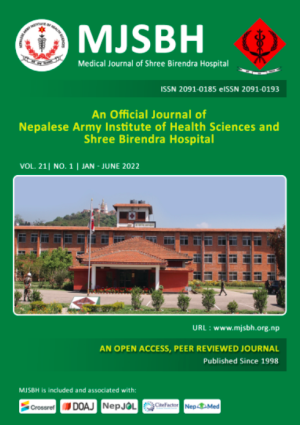Contributing Factors of Elective Surgical Case Cancellation: A Cross- Sectional Descriptive Study
Keywords:
Cancellation, Elective surgeryAbstract
Introduction: Elective surgical case cancellation refers to a scheduled surgical procedure that not performed on a given day. Cancellation of elective surgical operation recognized as a major cause of emotional trauma to patients as well as their families. It has been a long-standing problem for healthcare organizations across the world.
Methods: This was a cross-sectional observational study conducted from September 01 to November 30, 2021 for a period of three months in a 750-bedded tertiary care hospital, Kathmandu. A cancelled procedure was defined as a patient’s name appearing on the list for surgical operations but the operation not being performed on the scheduled date. Patients scheduled for surgical procedures were recruited into this study by the principal investigator and research assistants on the day prior to their operation.
Results: Of total 600 patients scheduled for elective procedures over a period of three months, the prevalence of cancellation of elective surgical procedures was found to be 15.33 % (n=92). Of the examined surgical specialties, the cancellation prevalence was highest in GI and HPB at 40.9% (n =47), closely followed by Urosurgery at 31(33.6%), general surgery17(18.47%), plastics, Paediatric surgery 5(5.4%) and burn and plastics surgery 2 (2.1%) having the least cancellationrate at 2(2.1%) which was statistically significant (p value<0.05).
Conclusions:Inadequate preoperative preparation, prioritized emergency cases and equipment shortages are the common causes of elective surgical cancellations.
Downloads
Downloads
Published
How to Cite
Issue
Section
License
Copyright (c) 2022 Medical Journal of Shree Birendra Hospital

This work is licensed under a Creative Commons Attribution-NonCommercial-NoDerivatives 4.0 International License.
This license enables reusers to distribute, remix, adapt, and build upon the material in any medium or format for noncommercial purposes only, and only so long as attribution is given to the creator.




